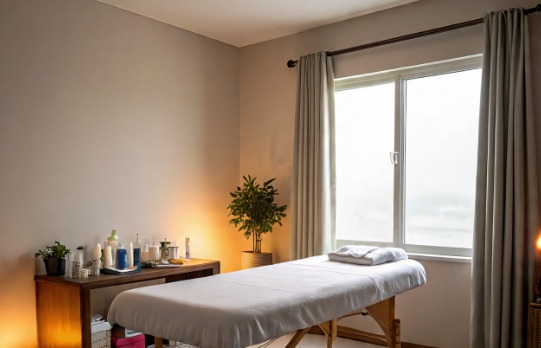When most people think of massage, they picture calm music, dim lights, and a quiet room — the perfect setup for relaxation. But beneath that peaceful surface lies something much deeper. Massage isn’t just about easing tight muscles or calming your mind; it’s about emotional healing — a process that reconnects you with your inner peace, balance, and emotional strength.
This is where massage goes beyond relaxation and becomes a powerful tool for emotional recovery and personal transformation.
The Hidden Connection Between Emotions and the Body
Our bodies and emotions are deeply linked. Every time we experience stress, fear, sadness, or anger, the body reacts. Shoulders tighten, the jaw clenches, and breathing becomes shallow. Over time, these reactions create physical patterns of tension that hold emotional energy inside the muscles.
You might not notice it, but your body remembers everything — every heartbreak, every anxious thought, every moment of pain. 구리출장마사지 Massage gives your body permission to finally let go of what it’s been holding.
As skilled hands move across tense muscles, those stored emotions begin to release, bringing both physical and emotional relief.
Touch: The Language of Healing
Human touch is one of the oldest and most powerful forms of communication. Long before words existed, touch was how we expressed comfort, safety, and love. That’s why massage can reach emotional levels that talk alone sometimes can’t.
When you receive a massage, your body releases oxytocin, the “love hormone,” which builds feelings of trust, safety, and calm. This hormonal shift tells your nervous system it’s okay to relax — that you’re safe in the present moment.
This sense of safety allows buried emotions to rise gently to the surface, where they can finally be felt and released. It’s healing through the language of touch, where no words are needed, only presence.
Releasing Emotional Blockages
Every emotion you suppress finds a place to live in your body. Grief often settles in the chest, anxiety in the stomach, and stress in the neck and shoulders. These become emotional blockages — areas where energy no longer flows freely.
Massage helps break through these blockages. When muscles loosen, the trapped energy begins to move again. Sometimes this release brings deep calm; other times, it may stir emotions — a sudden wave of sadness or even tears. This is completely normal.
It’s your body’s way of cleansing emotional residue, just as it releases physical tension. Once those emotions are released, you feel lighter, clearer, and more balanced — emotionally and physically.
The Science Behind Emotional Healing
Modern science supports what ancient healers have known for centuries: massage has a measurable effect on the brain and emotions.
It lowers cortisol, the stress hormone, while boosting serotonin and dopamine, the “feel-good” chemicals that elevate mood and promote mental clarity. This chemical balance reduces symptoms of anxiety, depression, and emotional fatigue.
Regular massage can help rewire your stress response — teaching your brain and body to stay calm under pressure. Over time, this builds emotional resilience, allowing you to handle life’s ups and downs with greater ease.
Mindful Touch: The Gateway to Self-Awareness
During a massage, you’re encouraged to slow down and become present with your body. You notice your breath, your heartbeat, and sensations you usually ignore in daily life. This awareness helps you connect with yourself in a way that’s deeply healing.
As your therapist’s hands move with care, you start to feel parts of your body you may have disconnected from — areas where pain or emotions have been stored. 구리출장안마 This process of mindful touch brings awareness and compassion to those places, reminding you that healing isn’t just physical; it’s a journey of self-discovery.
Massage becomes a form of meditation — a moment of stillness where body, mind, and emotion finally align.
Healing Emotional Trauma Through Safe Touch
For people who have experienced emotional trauma, touch can sometimes feel uncomfortable or even triggering. But when massage is given in a safe, respectful environment, it can become an incredibly healing experience.
Safe, nurturing touch helps the body learn that it’s okay to feel again. It retrains your nervous system to associate touch with comfort instead of fear. Over time, this gentle process rebuilds trust — not just in others, but in yourself.
Massage helps you reclaim ownership of your body, creating a sense of control, grounding, and peace. It’s not just therapy for the muscles — it’s therapy for the soul.
The Emotional Energy Flow: Restoring Balance Within
In holistic traditions like Ayurveda and Traditional Chinese Medicine, it’s believed that emotions flow through the body’s energy channels. When emotions are suppressed or unprocessed, they block this energy, causing both emotional and physical discomfort.
Massage helps reopen these pathways. As the therapist works on certain points or follows the body’s natural flow, energy begins to move freely again. This restored flow brings a sense of inner harmony — a quiet, balanced feeling that stays long after the session ends.
When your energy moves without obstruction, you experience a state of emotional peace — the feeling of being whole again.
The Calm After the Release
Many people describe an emotional shift after massage — a feeling of being lighter, calmer, and more at peace with themselves. This isn’t just relaxation; it’s emotional renewal.
After emotional release, your body often enters a deep state of stillness. Your breathing slows, your heart rate steadies, and your mind feels spacious. This peaceful state allows you to integrate the emotional changes that occurred during the massage.
Think of it as your body’s way of saying, “I’ve let go. Now I can heal.”
It’s a quiet reminder that true strength comes from softness — from allowing yourself to feel deeply and release freely.
The Emotional Benefits You Can Feel
The emotional healing power of massage can transform your well-being in many ways:
- Reduced anxiety and depression: Calmer hormones mean a more stable mood.
- Greater emotional clarity: You begin to understand what you feel and why.
- Deeper self-acceptance: Massage encourages body positivity and compassion.
- Improved relationships: When you’re at peace inside, you connect better with others.
- Renewed confidence: Emotional balance helps you move through life with ease and strength.
Massage helps you rediscover your natural emotional rhythm — one that flows freely, without the burden of stress or old wounds.
Why Emotional Healing Matters
Many people focus on physical health but forget that emotional health is just as important. Emotional pain, if ignored, can silently affect every part of your life — your focus, your energy, even your immune system.
Massage provides a safe, supportive space to release that pain. It allows healing to happen not through thinking, but through feeling — gently, naturally, and deeply.
Once the emotions trapped in your muscles are released, you experience a renewed sense of energy and calmness.
Emotional healing through massage reminds us that peace isn’t found outside; it’s created inside.
Beyond Relaxation — Toward Wholeness
The true power of massage lies in its ability to bring together what life often separates — body, mind, and emotion. Relaxation is just the beginning. Beyond it lies emotional renewal, mental clarity, and spiritual calm.
Each session is a small journey inward — a moment to reconnect with your inner world, to forgive, to release, and to begin again. Massage teaches you that you don’t have to carry everything alone; your body can help you let go.
The more you open up to the process, the more complete the healing becomes.
Conclusion: The Gentle Path to Inner Peace
Massage goes beyond luxury or relaxation — it’s a pathway to emotional freedom. It helps your body release what your heart no longer needs, creating space for peace, joy, and renewal.
Through the gentle power of touch, you rediscover a truth often forgotten in the chaos of life:
Healing doesn’t come from effort — it comes from allowing.





